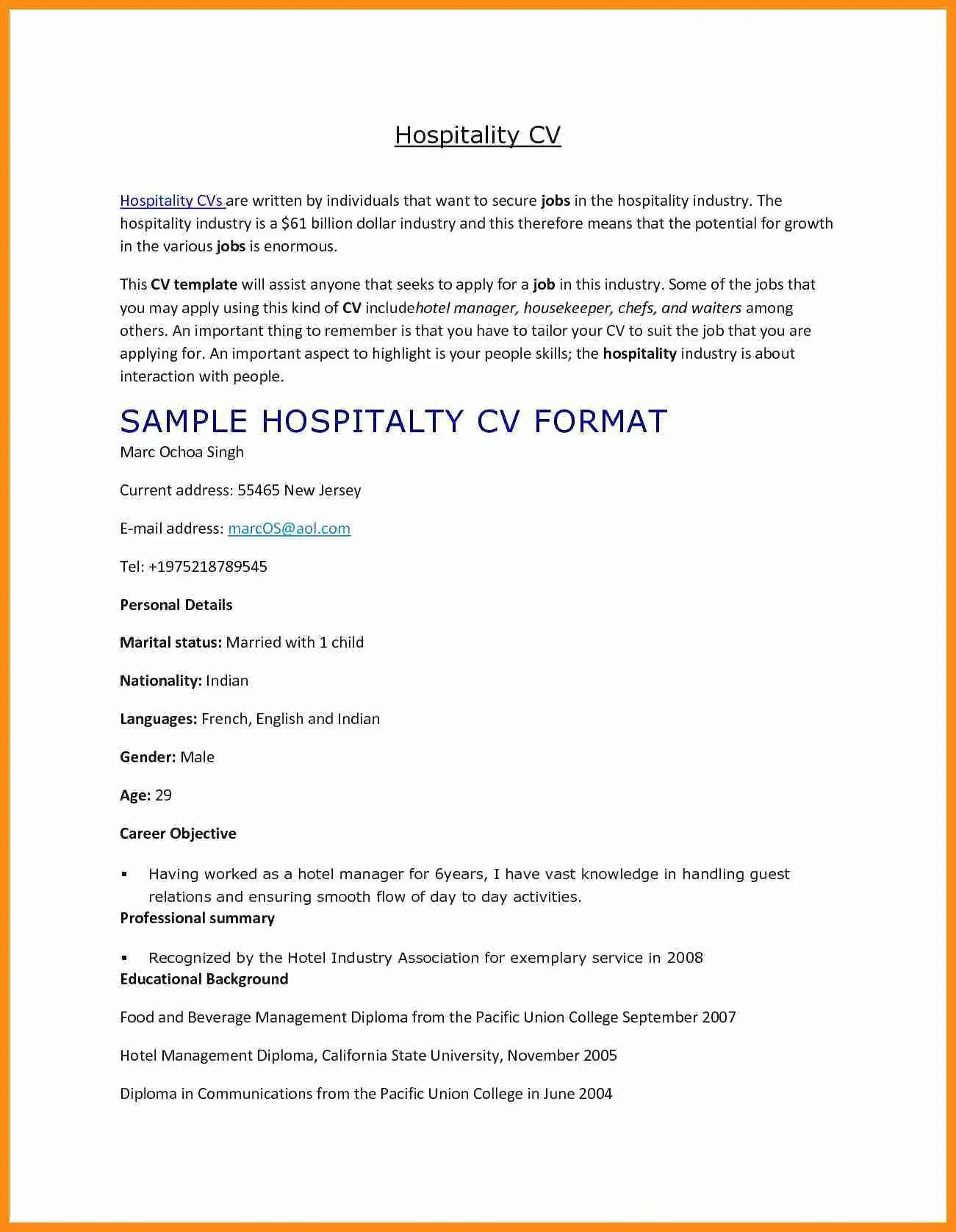Why a Hotel Cover Letter Matters
A hotel cover letter is more than just a formality; it’s your first opportunity to make a positive impression on a potential employer. It acts as a personal introduction, providing context to your resume and highlighting the skills and experiences that make you the ideal candidate for the job. In the competitive hospitality industry, a well-crafted cover letter can set you apart from other applicants. It allows you to showcase your personality, express your enthusiasm for the role, and demonstrate your understanding of the hotel’s values and goals. By taking the time to write a compelling cover letter, you significantly increase your chances of securing an interview and ultimately, landing your dream job in the hotel industry.
Showcasing Your Skills and Experience
Your cover letter is the perfect platform to showcase the skills and experience most relevant to the hotel position you’re applying for. Don’t just reiterate your resume; use the cover letter to elaborate on your accomplishments and explain how your skills align with the job requirements. Start by identifying the key skills and qualifications the hotel is seeking, and then provide specific examples of how you’ve demonstrated those skills in previous roles. Quantify your achievements whenever possible, using numbers and data to illustrate your impact. For instance, instead of saying you improved customer satisfaction, state that you increased satisfaction scores by a certain percentage. This targeted approach will demonstrate your understanding of the job and your ability to deliver results.
Highlighting Relevant Experience
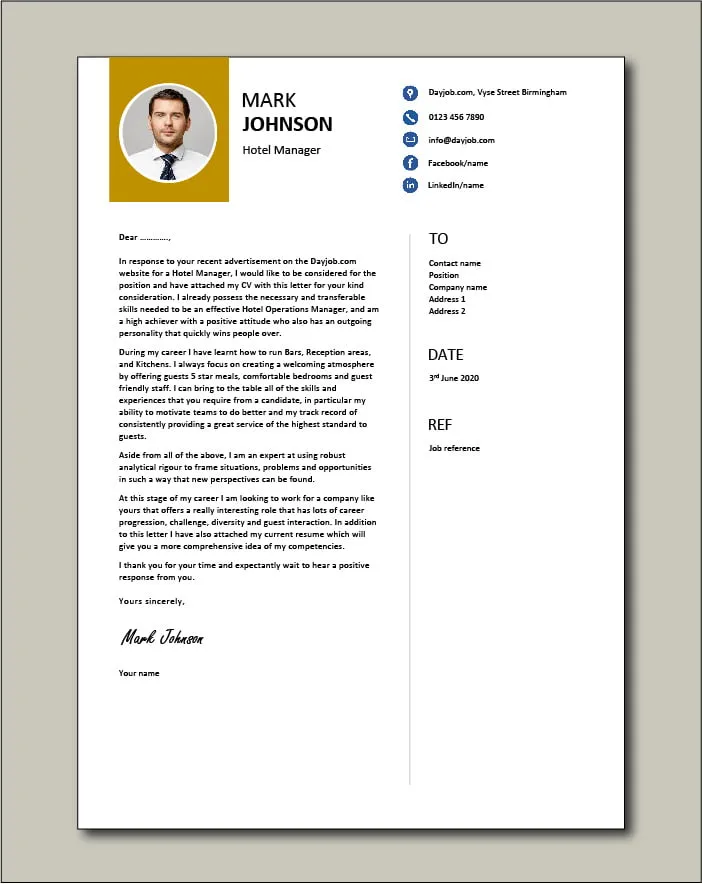
Focus on the experiences most pertinent to the job. If you’re applying for a front desk position, emphasize your experience in guest services, handling reservations, and resolving customer issues. For a housekeeping role, highlight your attention to detail, your ability to maintain cleanliness standards, and your experience with cleaning products and equipment. For a management position, discuss your leadership skills, your experience in team management, and your ability to drive operational efficiency. Use the STAR method (Situation, Task, Action, Result) to provide detailed accounts of your past experiences, demonstrating your ability to solve problems and achieve positive outcomes. Always tailor your experience to the specific requirements of the job and the hotel.
Detailing Your Customer Service Prowess
Customer service is the cornerstone of the hospitality industry, so be sure to highlight your customer service skills in your cover letter. Provide examples of how you’ve gone above and beyond to exceed customer expectations, such as resolving complaints, handling special requests, or providing personalized service. Emphasize your ability to remain calm and professional under pressure, your empathy, and your commitment to creating positive guest experiences. Mention any training or certifications you have in customer service, and be sure to tailor your examples to the specific hotel’s target audience and brand values. Illustrate your commitment to guest satisfaction with compelling stories and specific actions you’ve taken to ensure positive outcomes for guests.
Emphasizing Communication Skills
Effective communication is crucial in the hotel industry, as you’ll be interacting with guests, colleagues, and management daily. In your cover letter, highlight your verbal and written communication skills. Provide examples of how you’ve communicated effectively with diverse groups of people, handled difficult conversations, and conveyed information clearly and concisely. Mention any language skills you possess, as multilingual abilities are highly valued in many hotels. Showcase your ability to listen actively, empathize with others, and adapt your communication style to suit different situations. Be sure your cover letter itself is well-written, free of grammatical errors, and demonstrates your ability to communicate professionally and effectively.
Tailoring Your Letter for the Hotel
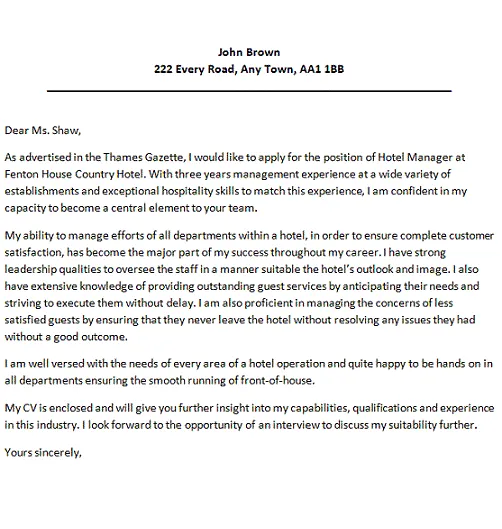
Generic cover letters are easily spotted, and they often fail to impress. To make your cover letter stand out, it’s essential to tailor it to the specific hotel and position you’re applying for. This requires research and a genuine interest in the hotel’s brand, values, and target audience. Take the time to learn about the hotel’s history, its amenities, its customer service philosophy, and its reputation in the industry. Mention specific aspects of the hotel that appeal to you, such as its location, its design, or its commitment to sustainability. Demonstrate your understanding of the role and how your skills and experience align with the hotel’s needs and goals. This level of personalization will show that you’re genuinely interested in the position and the hotel.
Researching the Hotel and Role
Before you start writing, conduct thorough research on the hotel and the specific role you’re applying for. Visit the hotel’s website to learn about its services, its target audience, and its values. Read online reviews to understand guest perceptions and identify areas where the hotel excels or could improve. Look at the job description carefully to understand the specific requirements and responsibilities of the position. Tailor your cover letter to address these requirements directly, using keywords from the job description. This research will not only help you tailor your letter effectively but also demonstrate your initiative and your genuine interest in the opportunity.
Using Keywords Effectively
Many employers use Applicant Tracking Systems (ATS) to screen applications. To ensure your cover letter gets noticed, incorporate keywords from the job description throughout your letter. Identify the key skills, qualifications, and responsibilities mentioned in the job posting and use these words and phrases naturally in your writing. However, don’t overuse keywords or stuff them into sentences unnaturally. Your cover letter should still read smoothly and convey your personality. Keywords help the ATS identify relevant applications, but the content of your letter should ultimately demonstrate your suitability for the role.
Structuring Your Hotel Cover Letter
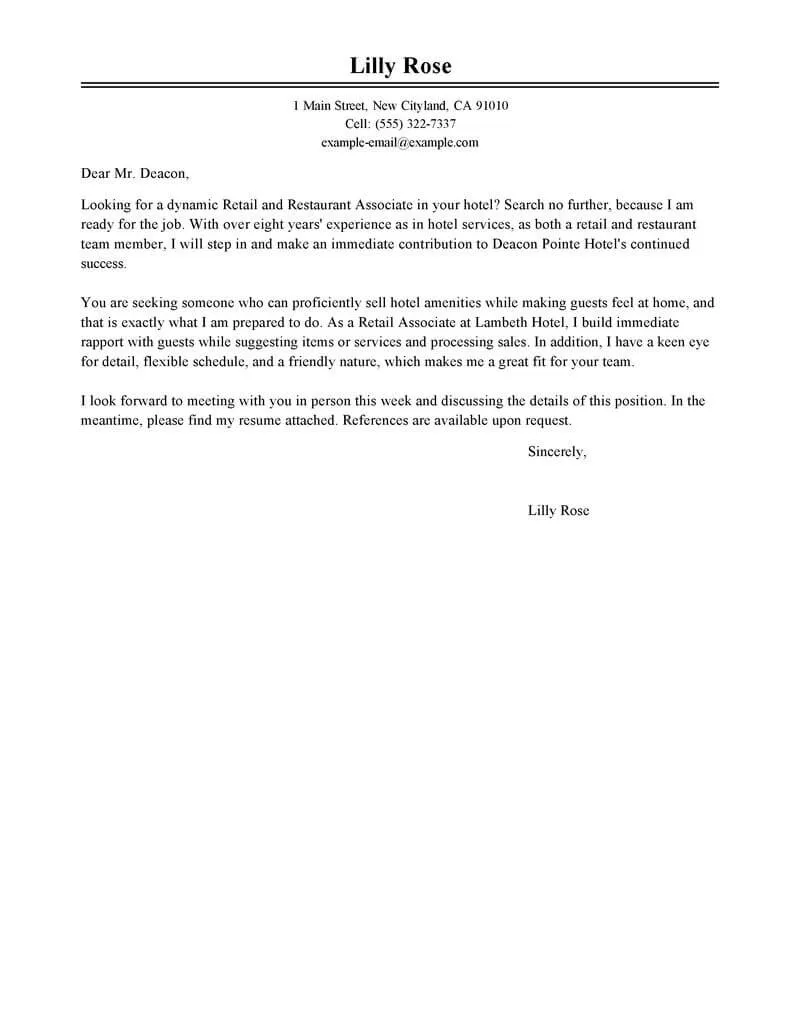
A well-structured cover letter is easy to read and effectively conveys your message. It should consist of the following key elements: a header, a salutation, an introduction, the body paragraphs, a closing, and a signature. The header should include your contact information, such as your name, address, phone number, and email address, as well as the date and the employer’s contact information. The salutation should be addressed to a specific person, if possible, or use a professional greeting. The introduction should state the position you are applying for and briefly explain why you are interested. The body paragraphs should highlight your skills, experience, and accomplishments, providing specific examples to support your claims. The closing should reiterate your interest in the position and express your gratitude for their consideration. The signature should include your typed name.
Formatting Your Cover Letter
Proper formatting is essential for presenting your cover letter professionally. Use a standard font such as Times New Roman or Arial, with a font size between 10 and 12 points. Ensure that your text is easy to read and that there is sufficient spacing between paragraphs. Use clear and concise language, avoiding jargon or overly complex sentences. Use bullet points to highlight key accomplishments or skills. Proofread your cover letter carefully for any errors in grammar or spelling. Save your cover letter as a PDF file to maintain the formatting and ensure it appears correctly on any device.
Writing a Compelling Opening
The opening paragraph is your chance to grab the reader’s attention and make a strong first impression. Start by stating the position you are applying for and where you saw the job posting. Then, immediately express your enthusiasm for the opportunity and briefly explain why you are a good fit for the role. You might mention a specific aspect of the hotel that appeals to you or a key skill that makes you a strong candidate. Keep it concise and engaging, aiming to capture the reader’s interest and make them want to learn more. Avoid generic openings and tailor your introduction to the specific hotel and position.
Crafting the Body of Your Cover Letter
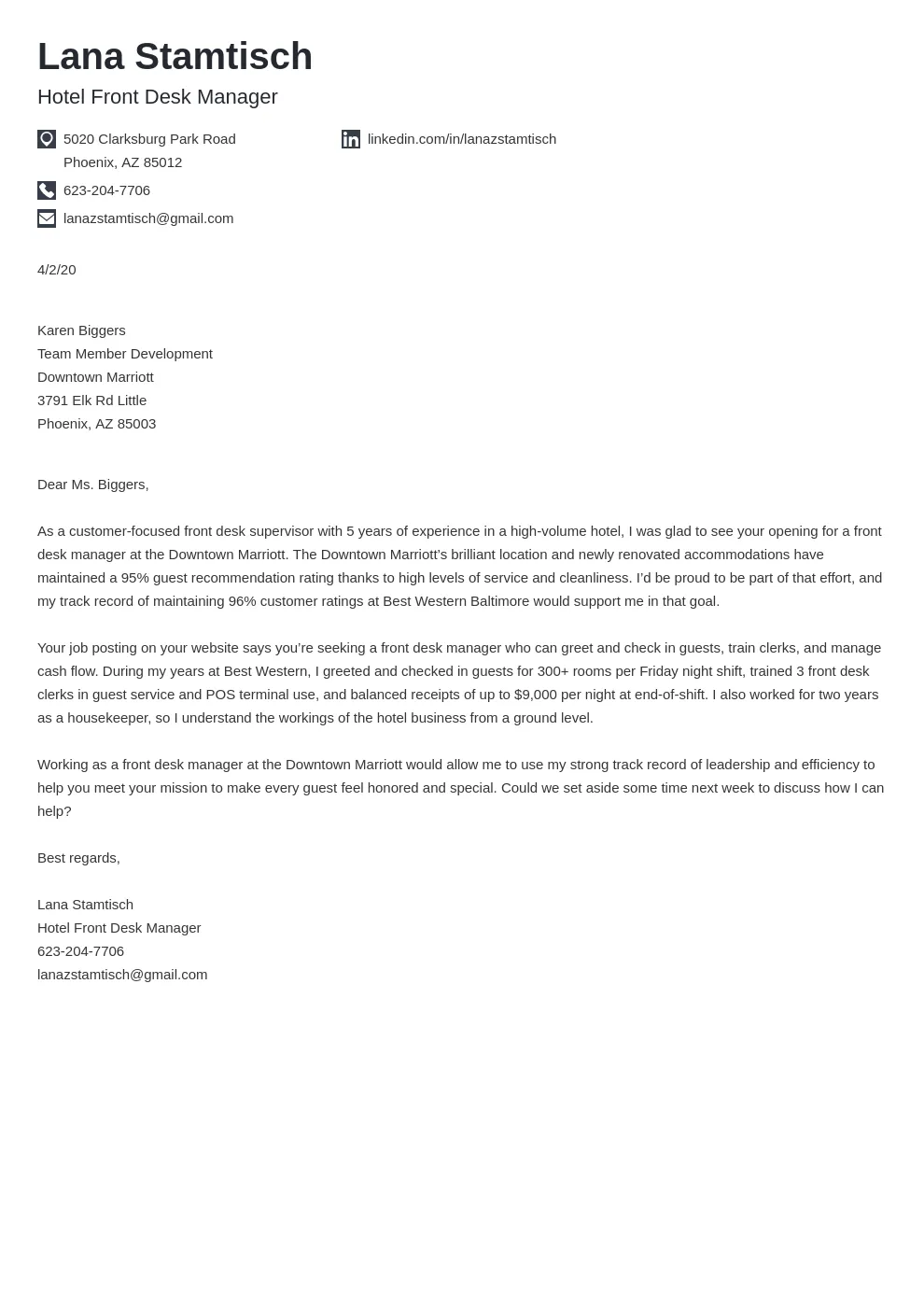
The body of your cover letter should provide detailed information about your skills, experience, and accomplishments. Organize your content into clear and concise paragraphs, each focusing on a specific aspect of your qualifications. Use the STAR method to describe your past experiences, focusing on the Situation, Task, Action, and Result. Quantify your achievements whenever possible, using data and numbers to demonstrate your impact. Relate your skills and experiences to the requirements outlined in the job description, and use keywords naturally. Ensure that your body paragraphs are well-written, engaging, and demonstrate your ability to deliver results.
Creating a Strong Closing
The closing paragraph is your opportunity to reiterate your interest in the position and express your gratitude for the employer’s time and consideration. Restate your enthusiasm for the opportunity and highlight a key skill or experience that makes you the ideal candidate. Include a call to action, such as inviting the reader to contact you for an interview or providing your availability for an interview. Thank the employer for their time and consideration, and express your hope to hear from them soon. End with a professional closing, such as “Sincerely” or “Best regards,” followed by your typed name.
Examples of Effective Hotel Cover Letters
Reviewing examples of effective cover letters can provide valuable insights and inspiration. Consider the following examples, adapting them to your personal experience and the job you are applying for. These examples should serve as a template for your own cover letter, but be sure to personalize it to make it your own and stand out from other applicants. Remember that it is essential to showcase your unique qualifications and experiences in your own words to make a lasting impression.
Front Desk Cover Letter Example
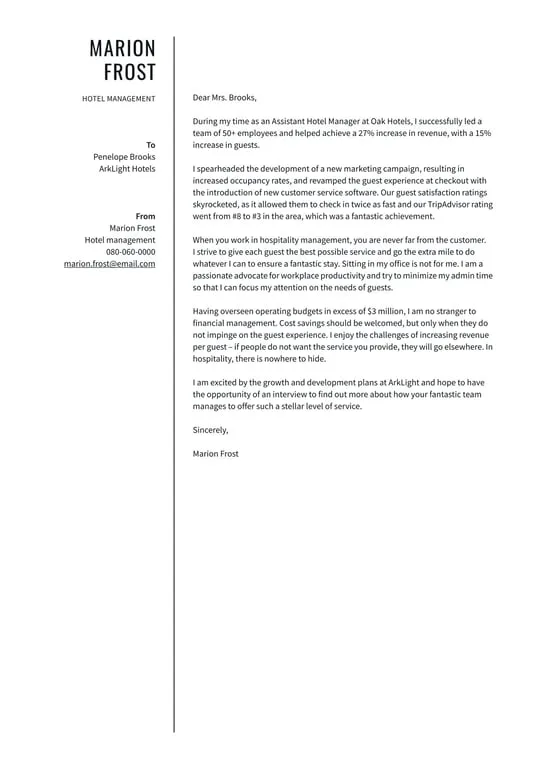
A front desk cover letter should emphasize your customer service skills, your ability to handle reservations, and your experience with hotel software. You can include a brief paragraph about your communication skills and your proficiency in multiple languages. Highlight your ability to handle guest inquiries efficiently and resolve any issues with professionalism. Mention your experience with check-in and check-out procedures, cash handling, and other relevant tasks. Always include details that you can prove, such as a percentage for guest satisfaction scores.
Housekeeping Cover Letter Example
For a housekeeping position, highlight your attention to detail, your ability to maintain cleanliness standards, and your knowledge of cleaning products and equipment. Showcase your physical stamina and your ability to work independently and as part of a team. Mention your experience with cleaning rooms, making beds, and maintaining public areas. Highlight your ability to follow instructions and adhere to safety protocols. You may also emphasize your reliability and your commitment to providing a clean and comfortable environment for guests. Provide examples to illustrate your ability to meet and exceed cleaning standards.
Management Cover Letter Example
A management cover letter should highlight your leadership skills, your experience in team management, and your ability to drive operational efficiency. Provide examples of how you have successfully managed teams, improved guest satisfaction scores, and increased revenue. Showcase your financial acumen, your ability to analyze data, and your experience with budgeting and forecasting. Mention any relevant certifications or training you have received. Highlight your ability to motivate and inspire your team, and demonstrate your commitment to fostering a positive and productive work environment. Focus on your successes in driving performance and meeting business goals.
Tips for Polishing Your Cover Letter
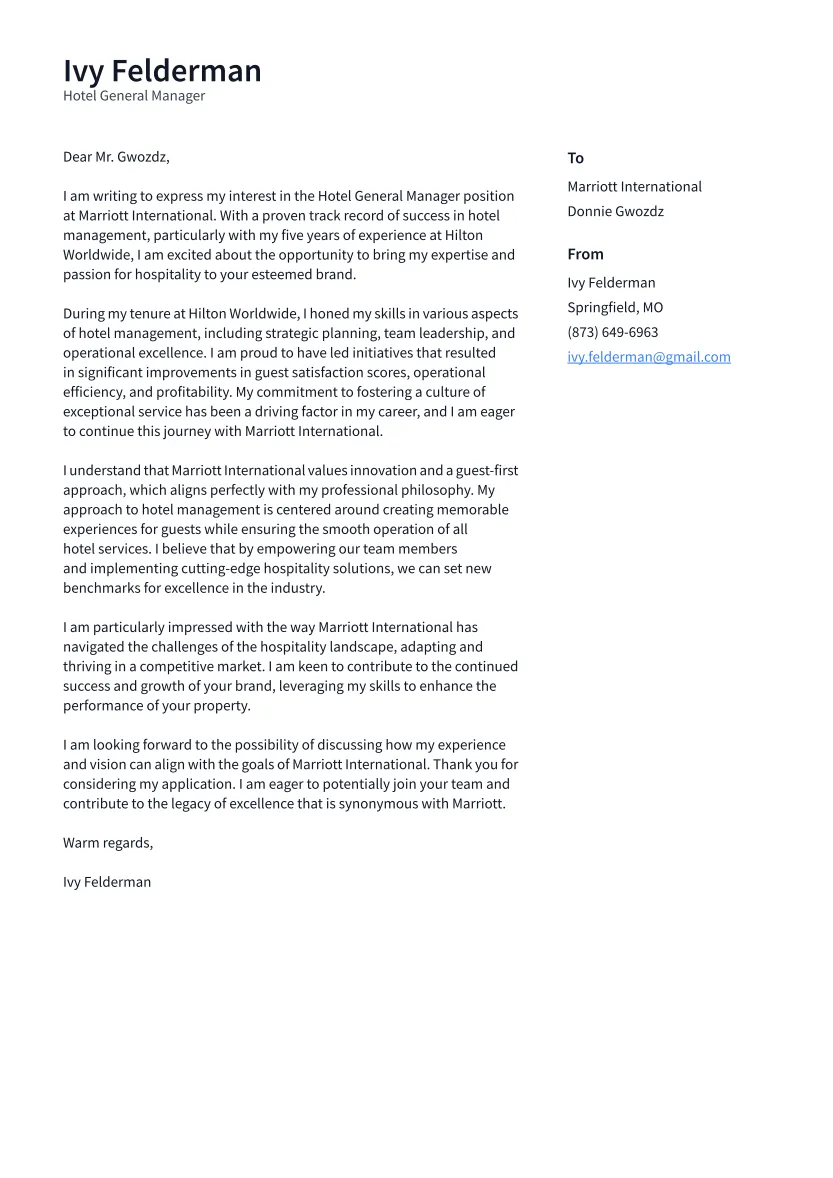
Once you’ve written your cover letter, take the time to polish it and ensure it’s the best it can be. This process involves proofreading, seeking feedback, and avoiding common mistakes. This effort will greatly increase your chances of making a favorable impression. Polishing your cover letter is as important as the initial writing process. It will help you to highlight your strengths and minimize any weaknesses, improving your overall chances of getting an interview.
Proofreading and Editing
Carefully proofread your cover letter for any errors in grammar, spelling, punctuation, and formatting. Read it multiple times, and consider reading it aloud to catch any awkward phrasing or grammatical errors. Use spell-check and grammar-check tools, but don’t rely on them entirely. Proofreading is important to catch any mistakes that can make you look unprofessional or careless. A polished and error-free cover letter demonstrates your attention to detail and your commitment to excellence.
Seeking Feedback
Ask a trusted friend, colleague, or career counselor to review your cover letter and provide feedback. Ask them to assess its clarity, conciseness, and overall effectiveness. Ask for input on whether the content highlights your skills and experience effectively and if it presents you in a positive light. Consider their feedback carefully and make any necessary revisions. Getting a second opinion can help you catch errors and make improvements that you might have missed on your own. It also ensures your cover letter reflects well on you and gets your application noticed.
Common Mistakes to Avoid
Be aware of common mistakes to avoid in your cover letter. These include: sending a generic cover letter, using jargon, making spelling or grammatical errors, and exceeding the recommended length of one page. Don’t rehash your resume; instead, provide additional details and insights that will make your application stand out. Focus on the unique value you bring and tailor your message to the hotel. Overly long letters can bore a potential employer. Your cover letter should be concise and to the point. Avoiding these mistakes will enhance your chances of creating a compelling cover letter.
Submitting Your Cover Letter
When submitting your cover letter, follow the instructions provided in the job posting carefully. If the instructions state to attach your cover letter as a PDF file, do so. Make sure that your contact information is up-to-date and accurate. Always address the cover letter to the correct person, and use a professional salutation. Use a clear subject line for your email, and double-check that you’ve included all the required attachments. Ensure that your cover letter complements your resume and presents you as a well-prepared and qualified candidate. Taking these steps will show your professionalism and will significantly increase your chances of getting the job.
Following Up After Submission
After submitting your cover letter and resume, it’s a good practice to follow up with the employer. Send a brief email or make a phone call a week or two after submitting your application. Express your continued interest in the position and reiterate your qualifications. This follow-up can demonstrate your enthusiasm and initiative, helping you to stand out from the other applicants. Be polite and professional in your communication, and thank the employer for their time and consideration. Follow-up shows you are truly interested in the position and reinforces your professionalism. It is an important part of the job application process.
Writing a compelling hotel cover letter is an essential step in your job search. By showcasing your skills, tailoring your letter, and presenting yourself professionally, you can significantly increase your chances of landing an interview and securing your desired position in the hotel industry. Remember to follow the guidelines provided and tailor your letter to the specific job and hotel, and you’ll be well on your way to a successful job application.
